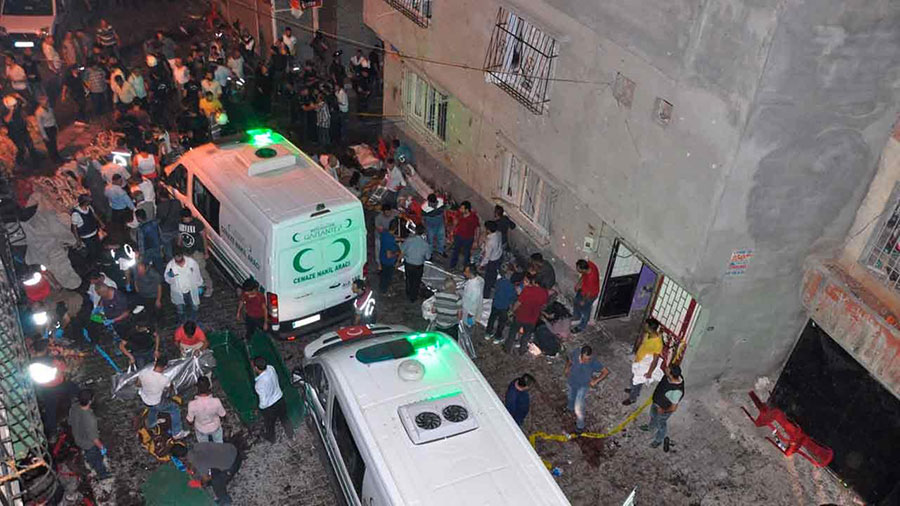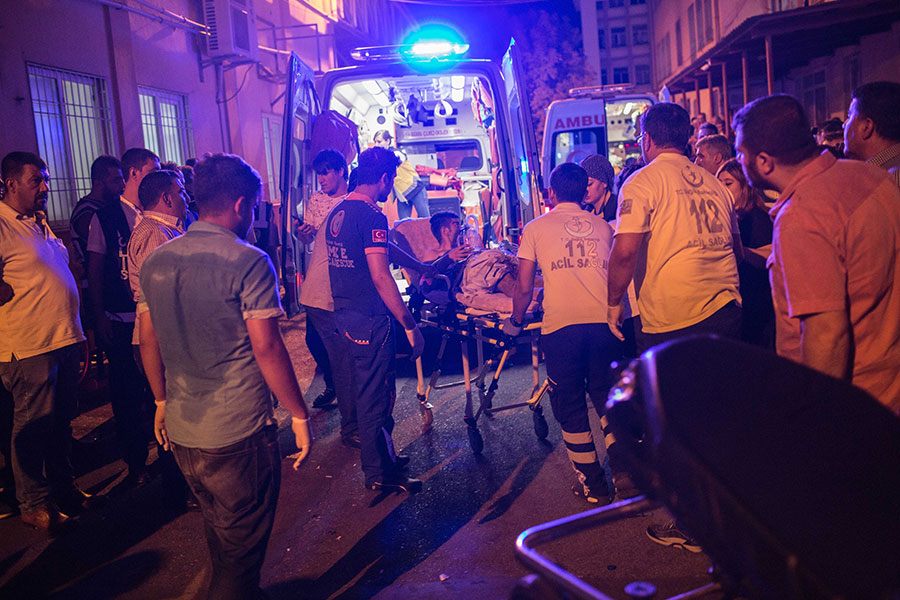President Erdogan stated that a child between 12 and 14 years old carried out a suicide bombing in a Kurdish wedding on Saturday, killing 51 attendants and injuring 69.
The Turkish leader claims that the Islamic State is to blame for the attack, which took place in Gaziantep, a city in close proximity to the Syrian city of Aleppo. According to official sources, around 200 people were attending a wedding in the Sahinbey district. Among the victims, there were two policemen. Both bride and groom were injured in the attack, but they were not severely wounded. The bombing took place in the neighborhood of Beybahce at 10:50 p.m. Authorities found traces of a suicide vest after the events.

Erdogan once again leaned on the claim that the Islamic State, the Kurdistan Workers’ Party (PKK) and the Gulenists are the same organizations. The July 15 coup attempt was blamed on the Gulenists, who are allegedly influenced by Fetullah Gulen, a Muslim cleric living in self-imposed exile in Pennsylvania.
An attack on Kurds residing in Turkey
It is believed that ISIS is the attack’s author as the Sahinbey District is near the Turkish-Syrian border. The location is teeming with refugees fleeing the Syrian war, and the city of Gaziantep has become increasingly vulnerable to actions that originate in Syrian territory. The assault was an attempt to further deepen the ethnic differences that the belligerents of the conflicts in Syria, Turkey, and Iraq have with each other.
Because ISIS’ presence in the battlefield has been steadily diminished with the aid of Turkish nationalist forces alongside U.S.-led airstrikes, the Islamic fundamentalist group has resorted to more frequent suicide bombings. Turkey is also in a critical period after the coup attempt, which has led to the incarceration of thousands of teachers, journalists, and military personnel.
Kurdish forces have also been critical to ISIS’ defeats in the battlefield. Many argue that Saturday’s bombing was an act of revenge for the loss of Manbij, a city located on a key supply route that connected the Turkish-Syrian border with Raqqa, which is under the control of the Islamic State.

A nation besieged by suicide attacks for years
Turkey has been attacked by terrorist dozens of times over the past few years, rising exponentially in 2016. Back in June, three individuals linked to ISIS attacked Istanbul’s Ataturk Airport using guns and carrying bombs, killing 36 people and injuring 147. All three assailants detonated their suicide vests, two of them at the international terminal and the other one in a parking lot.
That same month Istanbul saw another bombing. The terrorists targeted police officials as they were changing guard near Istanbul University. The attackers detonated a remote-controlled explosive device, overturning vehicles, damaging a hotel’s entrance and the windows of the 16th century Sehzade Mosque, killing 2 people and injuring 51. At first, it was believed that the attack was the work of the PKK or ISIS, but several days later the Kurdistan Freedom Falcons claimed themselves as the perpetrators.
A similar attack occurred in Istanbul in March, in the proximity of the district governor’s office. Five people were killed, including two U.S.-Israeli nationals. The place of the events was İstiklal Avenue, a livid shopping district which is considered by many to be Turkey’s most popular avenue. At first, Turkish authorities blamed the attack on the PKK, as they had bombed the city of Ankara back in February, but later they attributed the attack to ISIS.
Istanbul saw yet another terrorist attack in January, almost a year after a suicide bombing in the same city that killed the attacker and fatally injured two police officers. The bomber walked towards a group of tourists in Sultanahmet Square and then detonated the explosive device. There were 13 killed, and 12 of them were German and one was Peruvian. Coincidentally, the fountain in the Sultanahmet Square is German-built. The attacker was reported to be an ISIS “foot soldier” who entered Turkey posing as a refugee from Syria, as he was not registered on any watch list.

Turkey’s troublesome neighborhood
Turkey was widely open for refugees fleeing the Syrian civil war until recently. The nation now hosts over 2 million refugees, the world’s largest demographic, which leaves the country wide open to the entrance of ISIS operatives waiting to carry out devastating terrorist attacks.
Because Turkey is so important for the Middle East and for Europe, it has been acknowledged as a “bridge” between two continents, which is why the U.S., Russia, the EU, and ISIS are deeply involved with the outcome of Turkey’s current crisis. The coup attempt only made things more difficult, but it allowed President Erdogan to regain strength and to call on the support of foreign entities.
The United States is Turkey’s most prominent ally, but Erdogan has already stated his lack of trust with the American administration due to them giving asylum to Fetullah Gulen. It is for President Erdogan to stand for himself and his nation, as there are plenty of overseas interests in Turkey. The issue lies in the fact that Turkey lacks the intelligence operatives to safely stop suicide bombings from happening, which leaves them with the task of defeating ISIS on the battlefield as quickly as possible to effectively diminish their numbers and end their reign of terror.
Source: CNN
